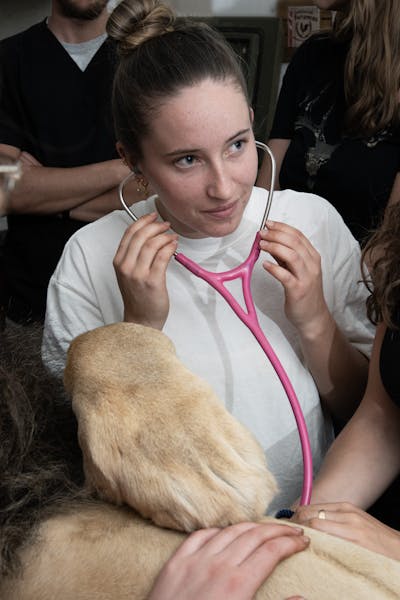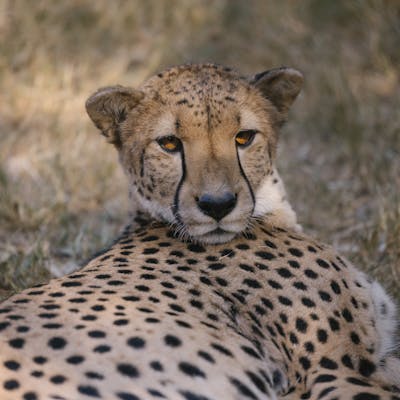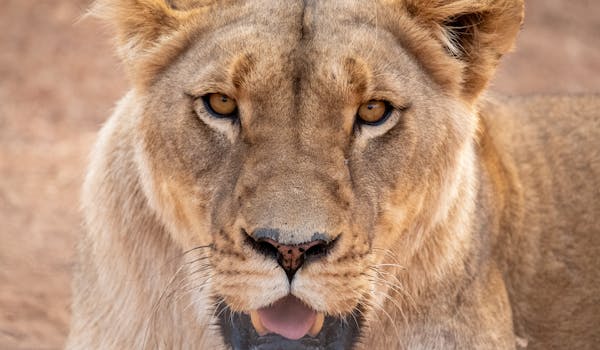Make it yours
Every experience is customised to be just right for you.

Join experienced wildlife veterinarians in the field.
Whether you’re monitoring the vital signs of a giraffe that’s just been darted from a helicopter by an expert vet, helping to relocate a herd of antelope deep in the bush, or learning how to care for a dog that’s been injured by a warthog, vet volunteering in Africa will open your eyes to a whole new world of veterinary practice.
Assisting specialist wildlife vets in their real day-to-day casework, you’ll experience hands-on clinical veterinary practice with Africa’s most iconic wildlife. With each new case and procedure, you’ll gain deeper insight into the realities of wildlife management, discover awe-inspiring landscapes, and learn about endemic diseases, specialist treatments and species-specific ecology from passionate vets and conservationists.





Choose your experience
Explore our wildlife veterinary programs.

Join experts protecting rhinos and lions, in the wild and at a specialist sanctuary
View details for Shimongwe Wildlife Veterinary Expedition
Team up with an experienced vet, treating wildlife in the wild and at a clinic
View details for Shimongwe Wildlife Veterinary Experience
Experience for yourself the adrenaline-fueled world of wildlife capture and relocation
View details for Wildlife Capture And Relocation Experience
Photo taken at the veterinary clinic at Moholoholo Wildlife Rehabilitation Centre
In South Africa, wildlife vets and nurses don’t just treat injured and sick animals. They also play a key role in the conservation and management of the region’s wildlife populations.
Much of South Africa’s wildlife is privately owned by large game reserves and breeding centres. This includes rare species of great ecological and financial value. Whether the estate owners are conservationists or business-minded, veterinarians all want to make sure animals enjoy a high standard of welfare and breed healthily.
Game reserve staff rarely carry veterinary qualifications, which means they rely heavily on vets to carry out important wildlife management tasks, including the capture and relocation of animals.
When volunteering with a vet in Africa, you’ll likely split your time between managing wildlife on game reserves and treating injured wildlife in rehabilitation centres, veterinary clinics and in the field. This combination of wildlife management and emergency care gives you the best possible introduction to real veterinary practice in South Africa - and the chance to pick up a wide variety of new career skills.
One of the common challenges you’ll experience as a wildlife vet volunteer in Africa is the need to sedate wild animals before working on them. Anybody who’s tried to approach a 2,000kg rhino in a state of distress will tell you it’s not a very good idea! As a veterinary volunteer in Africa, you’ll learn about and observe how to safely dart wild animals and about the sedative drugs used for the task.
In South Africa, only veterinarians have the training and license to handle these drugs and the dart guns that deliver the correct dosage. This means darting is a core skill for the wildlife vets we work with, and they’re world leaders in the capture and relocation of animals. If you’re interested in learning more about this part of wildlife veterinary practice, you couldn’t find a better set of tutors.
Rhinos in South Africa are under constant threat from poachers who remove their horns to sell, seriously injuring and usually killing the animal in the process. In an attempt to prevent poaching, many rhino populations now have to be horn-trimmed by a qualified wildlife veterinarian.
As there is with any form of surgery, there’s an inherent risk with these operations. But combined with anti-poaching security, horn trimming has been proven to have a positive impact on rhino populations. This means South Africa’s wildlife vets are currently at the forefront of the international conservation movement to save the rhino.
Wildlife vets in South Africa also monitor and prevent infectious diseases that can be passed from wildlife to domestic animals and, in extreme cases, even humans. In a country where fatal diseases such as rabies and tuberculosis are still prevalent, it’s vitally important that wildlife vets respond quickly to outbreaks and report any new instances to the state.
While dangerous animal-borne diseases haven’t been wiped out, South Africa’s veterinary community has successfully controlled infection levels. This has prevented the need for any culls or euthanasia programs.
The work of wildlife vets in South Africa, while vital in managing animal populations and preventing the spread of infectious diseases, is not funded by the government. The cost of immobilisation drugs and other medical equipment is high. Wildlife reserve owners may be reluctant to fund veterinary work, particularly for common wildlife species such as impala or waterbuck, where drug and vet costs are often more expensive than the value of the animal.
As a result, outside funding is vital to the well-being of Africa’s wildlife. Wildlife vet volunteers are an important source of this financial support and, if you choose to travel with us, a large part of your placement fee enables pro-bono work and supplements the enormous costs of wildlife veterinary work needed to improve animal welfare.
Volunteering with wildlife vets is ideal for anyone passionate about animal care - whether you're considering veterinary as a possible future career, you're a student looking for more vet work experience, a recent graduate seeking exposure to field cases, or a professional wanting to experience the iconic African wildlife. We also have dedicated wildlife vet experiences for those looking to fulfil clinical EMS hours, and veterinary science internships where you shadow professional wildlife vets.
At our programs in South Africa vet volunteers are part of a small, tightly-knit group, working side by side with some of Africa's most experienced wildlife veterinarians. You'll assist with real veterinary procedures, such as diagnosis, stitching and disease testing, as this is real veterinary work, not simulated training. There are no unnecessary procedures, and all interventions are done strictly in the animals’ best interests or to aid sustainable conservation. The specific tasks and procedures will depend on the cases that come in during your placement and your experience.
As a South Africa vet volunteer, you can gain experience with species such as rhino, giraffe, buffalo and antelope. Each new case offers a deeper understanding of wildlife management in action, exposing you to breathtaking landscapes, unique ecosystems, and the challenges of treating species-specific conditions.
The Shimongwe Wildlife Veterinary Experience offers the opportunity to join the day-to-day activities of experienced wildlife vets with real veterinary volunteer work. From animal darting and relocation to disease prevention and pregnancy testing, this wildlife vet volunteer program in South Africa exposes you to a wide range of unpredictable and exciting situations in the field.
Take the first step on your adventure by simply submitting an enquiry form. We offer ethical vet work experience tailored to your interests, experience level, and career goals. You can even combine multiple volunteering programs to create an exciting Combined experience. You can find out more about how we take time to create a customised African Conservation Experience that’s just right for you here.
We can't wait to speak with you about the opportunities to become a veterinary volunteer in Africa!